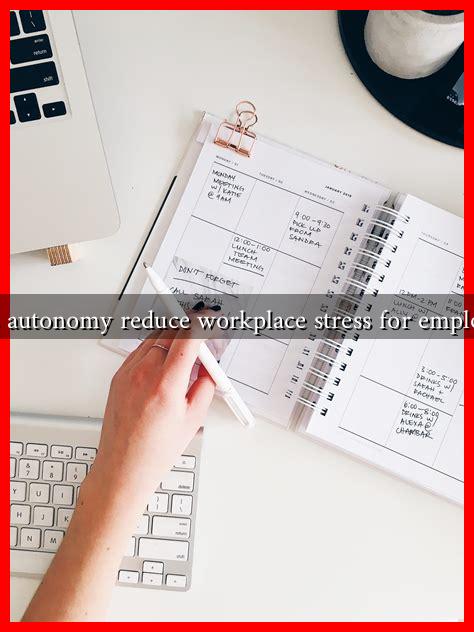-
Table of Contents
- Does Autonomy Reduce Workplace Stress for Employees?
- The Concept of Autonomy in the Workplace
- Understanding Workplace Stress
- The Link Between Autonomy and Stress Reduction
- Case Studies Highlighting the Benefits of Autonomy
- Statistics Supporting Autonomy’s Impact on Stress
- Challenges and Considerations
- Conclusion
Does Autonomy Reduce Workplace Stress for Employees?
In today’s fast-paced work environment, employee well-being has become a focal point for organizations aiming to enhance productivity and retain talent. One of the most discussed concepts in this realm is autonomy—the degree to which employees have control over their work. This article explores whether autonomy can effectively reduce workplace stress for employees, supported by research, case studies, and statistics.
The Concept of Autonomy in the Workplace
Autonomy in the workplace refers to the level of freedom and independence employees have in their roles. It encompasses decision-making power, flexibility in work hours, and the ability to choose how to accomplish tasks. Research indicates that autonomy can lead to higher job satisfaction and lower stress levels.
Understanding Workplace Stress
Workplace stress is a significant issue that affects employees’ mental and physical health. According to the American Psychological Association, stress can lead to various health problems, including anxiety, depression, and cardiovascular diseases. The following factors contribute to workplace stress:
- Heavy workloads
- Unclear job expectations
- Lack of support from management
- Inadequate resources
- Poor work-life balance
The Link Between Autonomy and Stress Reduction
Research has shown that providing employees with autonomy can significantly reduce workplace stress. Here are some key findings:
- Increased Job Satisfaction: A study published in the Journal of Applied Psychology found that employees who had more control over their work reported higher job satisfaction and lower stress levels.
- Enhanced Motivation: Autonomy fosters intrinsic motivation, which is crucial for employee engagement. When employees feel they have a say in their work, they are more likely to be committed and less stressed.
- Better Work-Life Balance: Flexible work arrangements, a form of autonomy, allow employees to manage their personal and professional lives more effectively, reducing stress.
Case Studies Highlighting the Benefits of Autonomy
Several organizations have successfully implemented autonomy in their workplace cultures, leading to reduced stress and improved employee well-being:
- Google: Known for its innovative work environment, Google allows employees to spend 20% of their time on personal projects. This autonomy has led to the development of successful products like Gmail and Google News, while also reducing stress among employees.
- Buffer: This social media management platform offers its employees complete flexibility in their work hours and locations. Buffer’s commitment to autonomy has resulted in high employee satisfaction and low turnover rates.
Statistics Supporting Autonomy’s Impact on Stress
Several studies provide compelling statistics that underline the positive effects of autonomy on workplace stress:
- A Gallup survey found that employees who feel they have a say in their work are 4.6 times more likely to be engaged at work.
- According to a study by the University of Warwick, happy employees are 12% more productive, suggesting that reducing stress through autonomy can lead to better performance.
Challenges and Considerations
While autonomy can significantly reduce workplace stress, it is essential to recognize that it may not be suitable for every employee or organization. Some challenges include:
- Overwhelming Choices: Too much autonomy can lead to decision fatigue, where employees feel overwhelmed by the choices they must make.
- Inconsistent Implementation: If autonomy is not uniformly applied across the organization, it can lead to feelings of inequality and resentment among employees.
Conclusion
In conclusion, autonomy can play a crucial role in reducing workplace stress for employees. By providing employees with control over their work, organizations can enhance job satisfaction, motivation, and overall well-being. However, it is essential to implement autonomy thoughtfully, considering the unique needs of employees and the organization. As companies continue to navigate the complexities of modern work environments, fostering autonomy may be one of the most effective strategies for promoting a healthier, more productive workplace.
For further reading on the impact of autonomy in the workplace, you can explore resources from the American Psychological Association.

